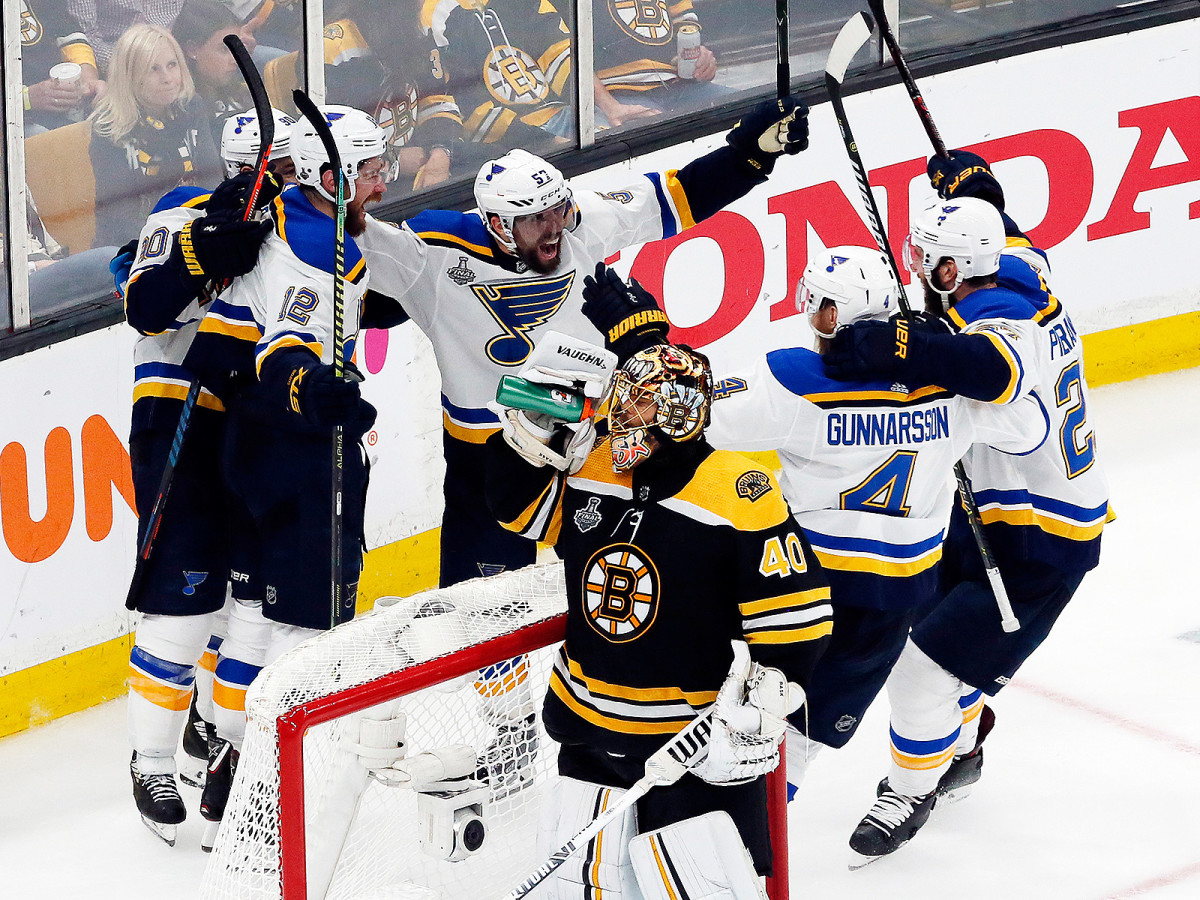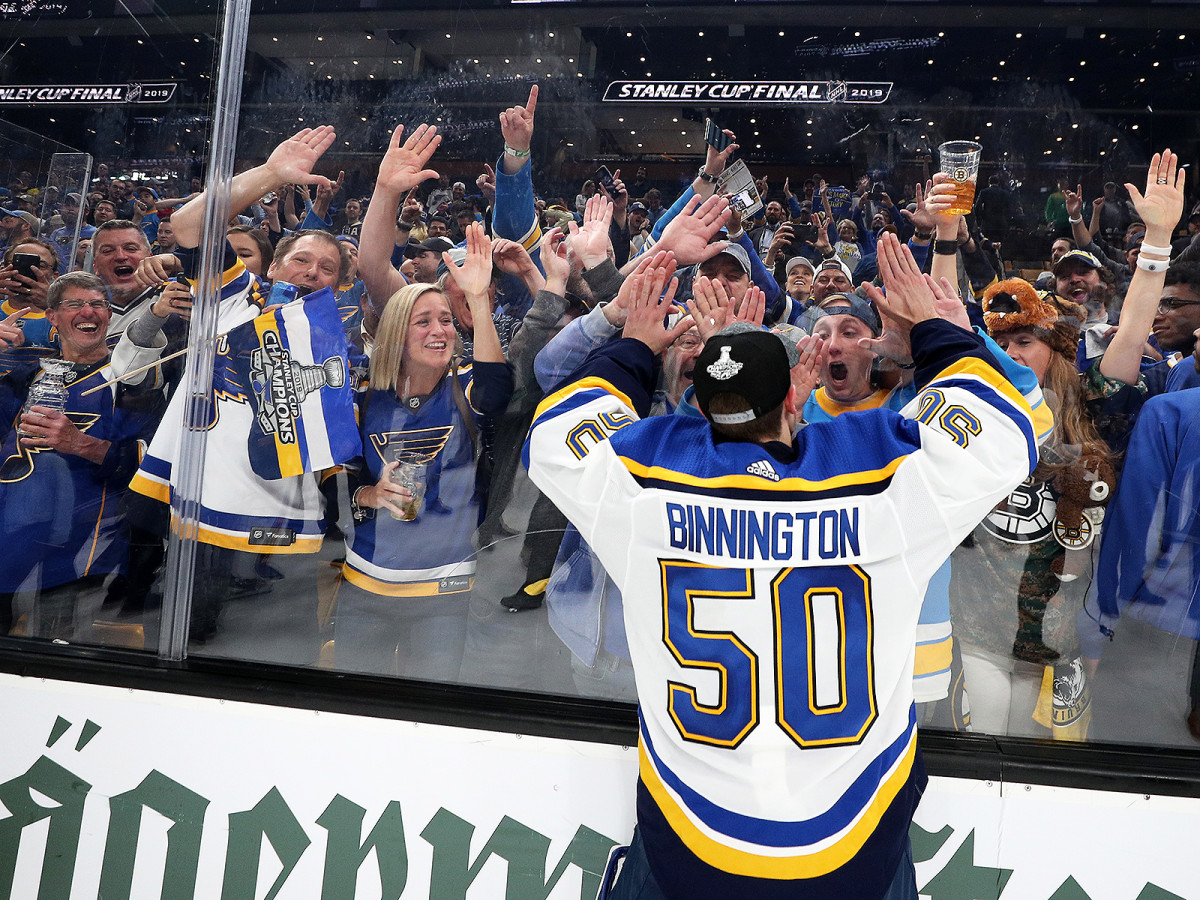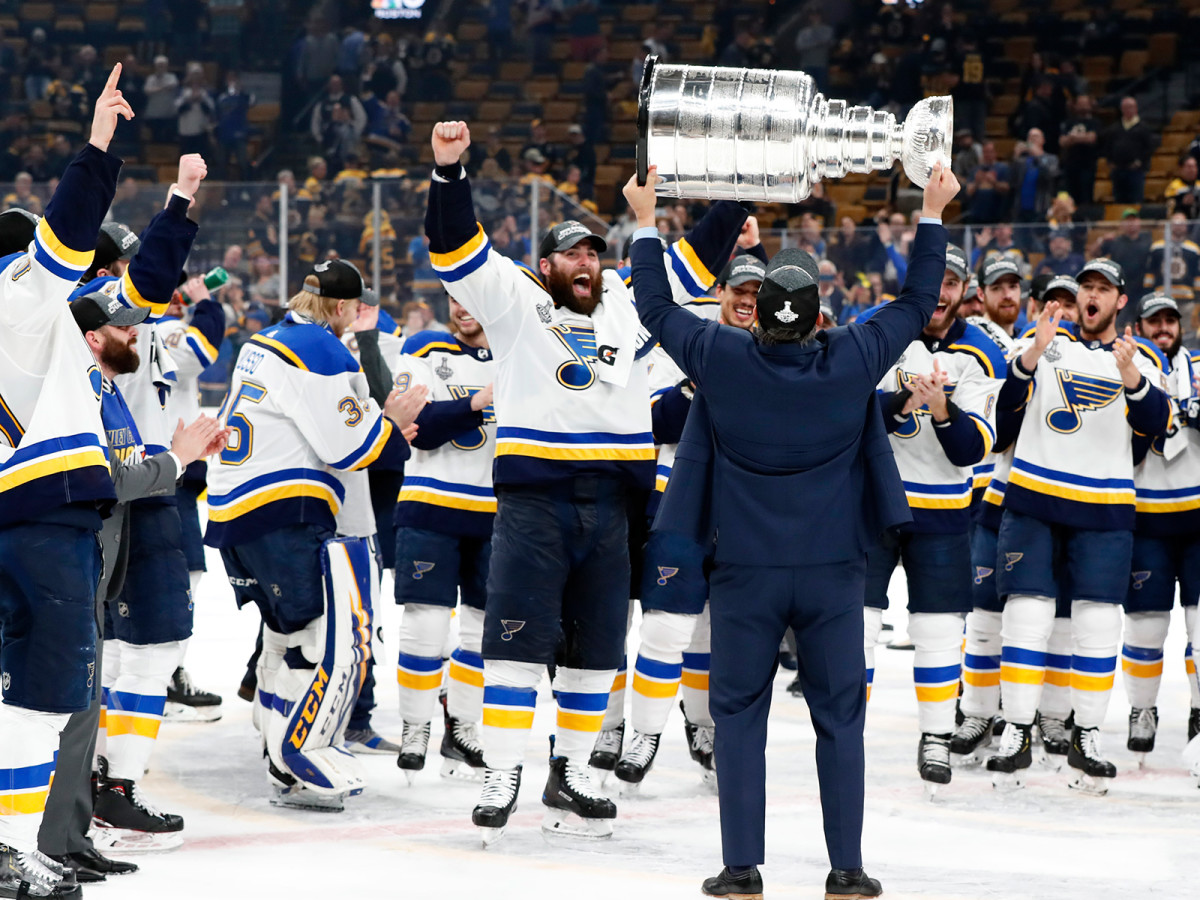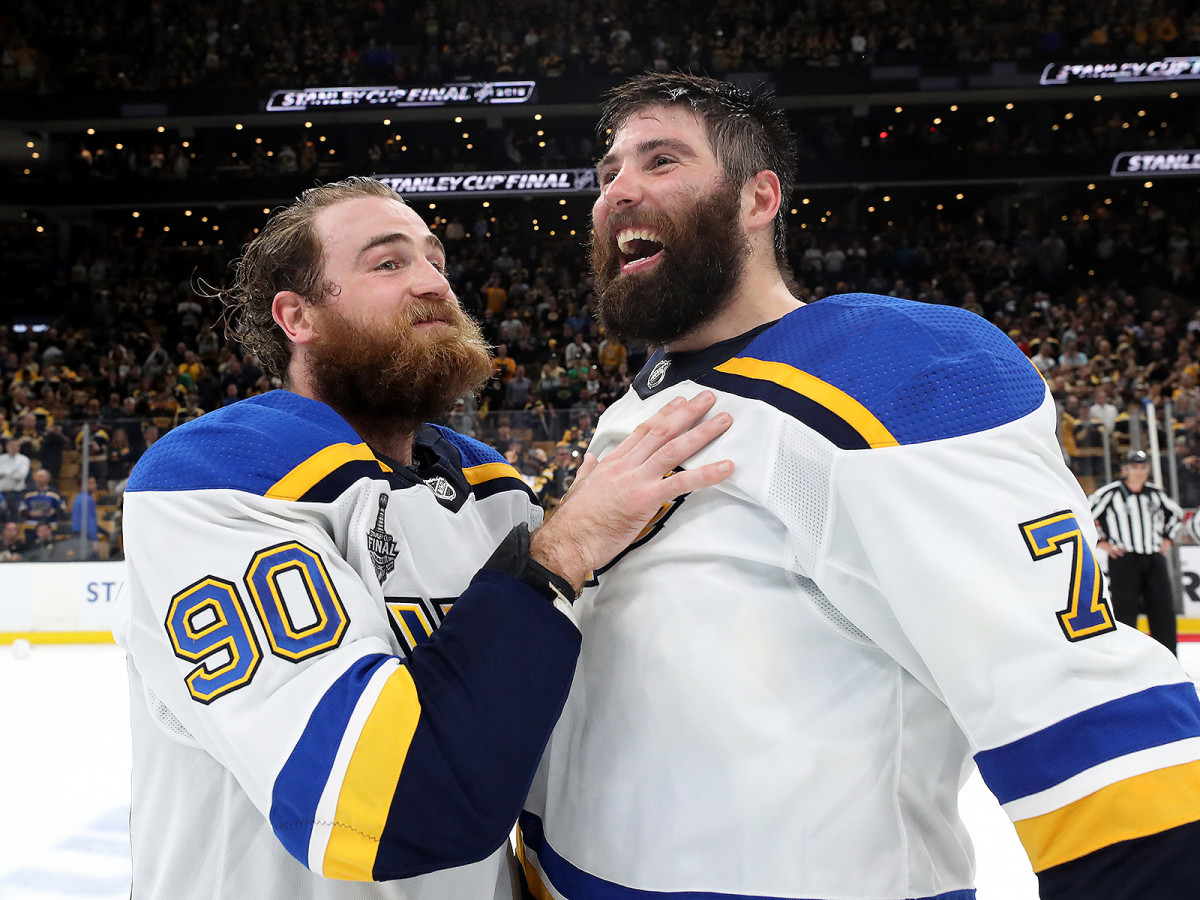Gloria! Blues Turn Lost Season Into Long-Awaited Stanley Cup Title

BOSTON — Twenty minutes past midnight, right after the teamwide, full-throated rendition of “We Are The Champions,” an urgent request is made for reinforcements. “We need more beer!” Blues defenseman Joel Edmundson hollers from the St. Louis locker room. “More beer!”
There is, obviously, more beer. A platform truck across the hall has been prestocked with six-packs, plus dozens of tall boys chilling in ice buckets. There is also endless champagne, boxes upon boxes ready for popping, spraying, chugging, sipping … or, in the case of winger Ivan Barbashev, emptying an entire bottle of brut over his head while FaceTiming friends.
The reinforcements arrive. The puddle on the floor grows into a pond.
First, the Blues quenched their franchise-long Stanley Cup drought at 52 years, suffocating the Bruins, 4–1, in Game 7 at TD Garden. Next, they partied. It started with five seconds still remaining Wednesday night, when players leapt from the visiting bench and hurled their gloves like confetti, evidently unable to wait any longer. It continued through the on-ice festivities as family and team pictures were taken, along with pulls from a bottle of dark liquor (origins unknown) floating through the crowd. Finally it migrated into the locker room, where center Brayden Schenn quieted the music for an announcement.
“Hey! Hey! Listen up real quick! We’ve got a song for everyone.”
• Get Your Blues Stanley Cup Champions Merchandise
The smart money here would be on “Gloria,” the pop anthem that the Blues adopted as their victory song in mid-January, back when they were still stuck near the league cellar. Instead, a guitar kicks in, followed by a banjo. It’s the opening chords of “Shipping Up To Boston.”
As usual, the Blues chose the hard route when they dropped Game 6 last weekend in St. Louis, spoiling a thousands-strong celebration along Market Street and instead schlepping east for the first Stanley Cup winner-take-all since 2011—the same year that Boston won its last title. But tackling adversity has been their default mode all season. What was one more hurdle? Since the NHL expansion era began in ‘67–68, no team had ever occupied last place after its 30th game and captured a championship. Then the superstar-less Blues rode an ironclad resolve, an icy-veined goalie and the backing of a thirsty sports town to complete one of the most remarkable turnaround stories in pro sports.
“This is historic,” said Blues executive and Hall-of-Fame defenseman Al MacInnis who would later declare his personal Cup wait—"30 years!"—while gulping champagne from the silver punch bowl.. “The one thing this game will do, it’ll test you right to the brink on how bad you want to win a Stanley Cup. And it didn’t push this team over the cliff. They hung on, and they deserved to win.”
Or, as captain Alex Pietrangelo puts it, taking a quick booze break with a bottle of Gatorade, “We’ve been through a whole lot of s--- together, and we found a way to get through it.”

Back from the ice, general manager Doug Armstrong has barely entered the locker room when he is wrapped in a full embrace. A few quiet seconds pass, the moment savored, until winger Vladimir Tarasenko leans closer and whispers, “Thank you for keeping us the same.”
Four months ago, Armstrong had reached a crossroads halfway around the world. While attending an under-18 tournament in Russia, he watched from afar as the Blues peeled off consecutive victories over Tampa Bay and Florida, followed by a back-to-back, home-and-home sweep of eventual Central Division-champion Nashville. At the time Armstrong had been weighing his trade deadline options, wondering whether to ship away rental contracts—or, worse, blow up the core. “That’s when the for-sale sign officially went off,” Armstrong said.
Aside from firing Mike Yeo and promoting Craig Berube in November, perhaps the smartest thing that Armstrong did this season was … nothing. Trusting that an 11-game, franchise-record win streak throughout Feburary wasn’t fool’s gold, he kept the roster intact when the deadline passed. "Doubled down on us," Edmundson says. As a reward for his confidence the Blues ultimately finished third in the Central, then gritted out long series victories over Winnipeg (4–2), Dallas (4–3) and San Jose (4–2) before outlasting the Bruins. “The guys just needed me to go to Russia to get going,” Armstrong said.
There is reason why Armstrong was attending that particular event, linked to their current triumph. Among a flurry of free agent signings to bolster St. Louis’s forward corps last summer—David Perron, Patrick Maroon and Tyler Bozak—he had also shelled out a pricey package to Buffalo for center Ryan O’Reilly, including a top-10 protected draft pick. Since the Blues appeared to be headed for the lottery at the time, Armstrong wanted to check out some prospects. Now, in no small part thanks to O’Reilly, they will gladly settle for selecting 31st.
The early rounds of the playoffs belonged to winger Jaden Schwartz, whose three-goal performance in Game 5 against the Sharks was commemorated when he awoke to find a pile of hats left by neighbors outside the front door of his St. Louis condo. But no player dominated Boston more than O’Reilly, the Conn Smythe Trophy recipient with nine Cup final points, including goals in the final four games. Wielding his singular fish-hook stick blade, the grizzly, cerebral 28-year-old was a menace on both ends, whether hanging onto the puck for long offensive zone shifts or retrieving Bruins dump-ins with the smoothness of a veteran blueliner. All while battling a cracked rib.
Still, heroes emerged from many sources. There was defenseman Carl Gunnarsson, crossing paths with Berube in the bathroom prior to overtime of Game 2 and calling his shot. There was Massachusetts native Zach Sanford, not only capably replacing suspended forward Oskar Sundqvist in Game 3 but registering four points against his favorite childhood team over the remainder of the series, including a goal in Game 7. And, please, big ups for a defensive corps led by the shutdown pair of Jay Bouwmeester and Colton Parayko, which limited Boston’s five highest-scoring forwards to one even-strength point entering Game 6.
As predicted, Bouwmeester received the Cup first from Pietrangelo, ending a personal wait that lasted nearly as long as his franchise’s (1,259 combined regular-season and playoff games). Alex Steen came next, if nothing else to appreciate the sacrifice of an alternate captain accepting a lesser role as a fourth-liner, and on it went. Before long it was Parayko’s turn, another worthy Conn Smythe candidate given how well he neutralized offensive threats (Blake Wheeler, Tyler Seguin, Logan Couture, to name several) throughout the spring. As such, perhaps in acknowledgment of mutual greatness, Parayko would hand off the trophy to its next recipient while screaming above the din, “You’re an absolute savage!”
And, finally, Jordan Binnington freaked out.

It’s 1:06 a.m. The visiting bench is strewn with the usual postgame detritus—water bottles, Gatorade, towels—as well as a few cans of Coors Light. Changed out of his champagne-soaked Stanley Cup T-shirt and back into a burgundy travel suit, Binnington leans against the side boards. His eyes wander to the empty rink.
As the Blues’ lead stretched to 3–0 and 4–0 in the third period, the 25-year-old had tried to keep total focus. “Right till the very end, I was like, ‘Come on, stay strong, stay strong,’” he says. Based on this standard, he is still bothered that the last of Boston’s 33 shots on goal went bar-down from Matt Grzelcyk, breaking the shutout. But he’ll survive. “Ah, f---, man,” Binnington says. “Just the feeling that we did it, you know? It was incredible. Grabbing onto whoever was around me in the pile was f------ awesome.”
By now, the basics of his journey are well-told. Buried as the fourth-stringer on the depth chart, one season after he was loaned to Boston’s AHL affiliate because the Blues couldn’t find room for him with their own, Binnington fell into the starting job in January and never bothered climbing out. In becoming the first rookie to win all 16 games en route to the Cup, he proved especially impervious to pressure, stopping 74 of 79 total shots after Boston victories, including a 32-save masterpiece in Game 7. “Lights out,” Pietrangelo says. “Hell of a story.”
The turning point came two summers ago. Back home outside Toronto following his fourth pro season in the minors, Binnington and his buddies had just thrown an especially raucous boat party. “It was amazing,” he says. “But I got sick. Like, sick-sick, for five days.” This caught the attention of Matt Nichol, who runs the BioSteel gym where Binnington trains each offseason. "He was behaving like a normal guy his age," Nichol says. "The problem is, if you want to be a starting goalie in the NHL, that’s not normal." One afternoon, once he was well enough to resume workouts, Binnington was stretching with a foam roller when Nichol entered the room and began quietly scribbling on a whiteboard.
“He didn’t say anything the whole time,” Binnington recalls. “I was like, what the f--- is this guy drawing?” Looking closer, Binnington saw three images and three dollar amounts. On the far left was a small boat, linked with $650,000. Then a medium-sized boat at $1.5 million, followed by a full-blown yacht at $2.5 million. Nichol wasn’t listing schooner prices, but rather NHL salaries that Binnington would need to earn before justifying those purchases. “That was the moment that he looked at me and was like, ‘Binner, you have the talent. It’s a matter of focusing.’”
The message was soon hammered home by another one of Binnington’s mentors, goalie coach Andy Chiodo. Sitting at a local coffee shop, Chiodo pulled out a notebook and wrote Binnington’s name in the center. Then he drew lines branching out to various lifestyle categories—hobbies, house, car, wellness, etc.—and ranked Binnington’s progress with him on a five-point scale. “Based on where I wanted them to be, everything was a two out of five,” Binnington says. Like Nichol, Chiodo saw untapped potential masked by uneven work ethic. The goal: “Looking at every aspect of his life and identifying why it’s important that he needs to be on a one-way contract, a year from that date, and why it’s important to maximize with no regrets.”
How can Binnington have any now? He was immediately tested in ‘17–18 when St. Louis tried turfing him to the ECHL, but became an AHL All-Star with the Providence Bruins after boldly refusing the lesser assignment. And upon joining the Blues this season, pitching a shutout in his debut on the same Philadelphia trip where “Play! Gloria!” was conceived, Binnington happily reported to friends that, drawing from his spiffy new $650,000 NHL salary, he had splurged by upgrading from a midsize rental car to a black Mustang convertible.
“And I said, ‘Hey, it’s a lot of money,’” recalls Mike Liut, the former Blues goalie and Binnington’s agent.
“Yeah, yeah,” his client replied. “but I’m in the show, I’ve got to look the part.”
A restricted free agent this summer, Binnington will soon get paid the part too. Just watch the Game 7 highlights to see why: Lunging to his right on a first-period power play, denying Brad Marchand; keeping the left pad down as David Krejci barreled on a partial breakaway; stretching across the crease to block Joakim Nordstrom with 11 minutes left. He was locked until the final buzzer, when the Blues bench emptied and mobbed his way, one hell of a story complete.
“I’m going to have quite a Cup party,” he says. “I’m gonna drop like 50k.”

In the hallway outside the locker room, as Armstrong shuts the door for a team-only meeting, a single man sits dry. Absent a change of clothes, Bobby Plager has not dared venture past his current perch. The original Blues defenseman would rather sip beer than bathe in the stuff.
Famously, Plager does not watch the games. He paces around the press box, nerves frayed, listening for cheers before popping into a suite to check the replay. In the third period, though, he headed down to the tunnel for the on-ice celebration. There Tarasenko (11 playoff goals) and some other Blues insisted that he hoist the Cup, a half-century after Plager helped lay the foundation of the franchise. “Just wanted to play one game in the NHL as a little kid,” Plager said later, “and what’s happened to my career in St. Louis is more than I ever expected.
“Just living the dream.”
How many other longstanding sufferers had theirs come true too? Surely Brett Hull, Bernie Federko, Keith Tkachuk and dozens more alumni who settled beneath the Gateway Arch, transforming the city into a thriving youth hockey market. Definitely John Oefelein, an 87-year-old season-ticket holder since the Blues’ expansion season in ‘67–68. His friends at competitive bridge club teased him for having faith when the Blues were struggling earlier this year, but the Santa-white playoff beard that he was growing—much to the chagrin of wife Sue—was duly rewarded. As he texts after Game 7, “what a game, there [sic] best of the play off! I need oxygen Sue and I cheered loudly all night.”
It is a unique connection, this team and this city. “It’s hard to explain to people from outside St. Louis,” Blues owner Tom Stillman says on the ice in Boston, but then he tries. “I can’t tell you how many people over the years have come up to me and said, ‘My father passed away last week, and he’s a big Blues fan, and I want you to know that we followed his wishes, which were to bury him in his Blues jersey. That has happened dozens of times … And then the pictures of people in weddings where the wedding parties are in Blues jerseys. It’s quite an emotional tie.”
“It doesn’t matter of it’s five or 500 games,” MacInnis adds. “You’re loved in St. Louis when you throw that jersey on. You’re never forgotten. That’s what makes St. Louis special.”
No one knows better than Maroon. Hailing from nearby Oakville, young Pat grew up attending Blues games, either using his grandfather’s season tickets or sitting in his father Philip’s lap in the obstructed corner seats for $5. School reports were filled with pictures of hockey players, sometimes wearing No. 7 St. Louis jerseys. A Hull and Oates poster hung in his bedroom.
When the Blues hit their nadir this season, Maroon took it hardest. Though he had accepted a pay cut to sign with the Blues in free agency, largely to spend more time with his son, Anthony, pressure was mounting on the winger. “He felt like he was letting down the city,” agent Ben Hankinson says. After sitting as a healthy scratch against the Islanders in early January, Maroon met with Armstrong to discuss his future. The option to ask for a trade was presented. Maroon declined. “I want to be here, I want to fight through this,” he told Hankinson.

But look at Maroon now. Lowering the Cup so Anthony can kiss it. Raising the Cup so Philip can hold it. Screaming into a phone held by his mother, Patti: “WE DID IT!”
They did it for the sellout crowd at Enterprise Center, and the thousands more who braved the rain to watch from Busch Stadium. The old-timers who saw Bobby Orr soar through the air in 1970 and, nearly five decades later, felt catharsis. The newcomers who, like today’s generation of Bostonians, might ultimately be raised spoiled rotten if the Blues can recapture their magic in '19–20. “The Cardinals have had so much success for so long. For us to get to that point too and enjoy it … “ Pietrangelo says, trailing off.
Goodness knows how much chuggable beer will soon be available in the land of Anheuser-Busch, but the Blues will soon find out. At 1:15 a.m., everyone begins heading to the charter buses. Pietrangelo leads the way, hefting the Cup. Armstrong isn't far behind, wearing a championship T-shirt and holding his soaking-wet suit. A plane was ready on the tarmac in Boston, and another afterparty at Enterprise Center awaits their landing in St. Louis. Plus, of course, the parade along Market Street in a few days.
So perhaps the hometown kid should get the last word, disappearing up the bus stairs while singing the bass line to “Seven Nation Army.”
“F------ right, boys,” Maroon says. “Where’s Lord Stanley?”
